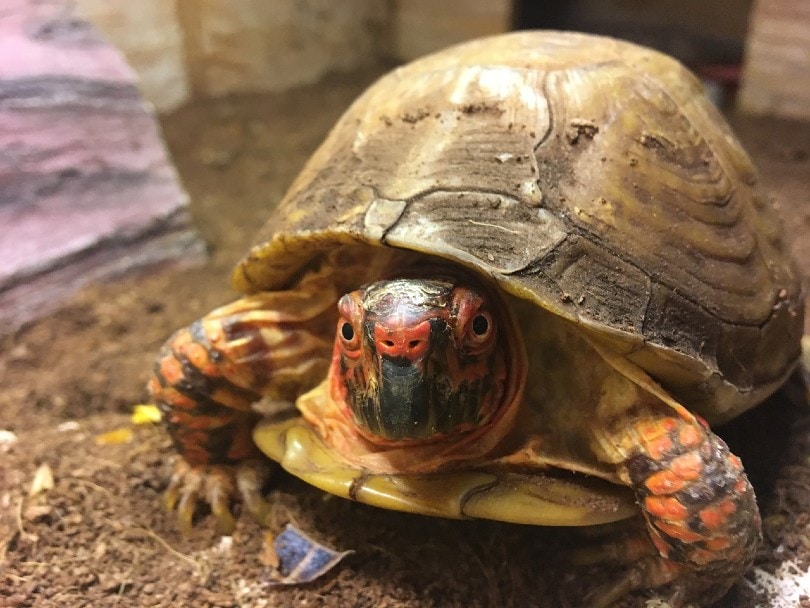VET APPROVED

The information is current and up-to-date in accordance with the latest veterinarian research.
Learn more »Turtles are traditionally quiet animals, but they do make some noises, such as hissing. If you notice your turtle hissing every once in a while, you probably don’t have anything to worry about. However, frequent hissing often means that your turtle is likely threatened.
To find out more about why your turtle is hissing, read on as we look at the two top reasons for a turtle hissing and things you can do about it. At the end, we mention other sounds you may want to listen to from your turtle. Let’s get started.
The 2 Reasons Why Your Pet Turtle Is Hissing
1. They Are Retracting Into Their Shell

As we mentioned above, turtles may produce a hissing noise when they rapidly retract into their shell. If you hear your turtle hiss every once in a while, it is simply because the turtle is retracting into their shell. When this is done quickly, the sound of air being expelled from their bodies may sound like a hiss.
This happens due to the way a turtle breathes. For turtles, breathing is achieved by coordinated movements of the muscles attached to their pelvic and shoulder girdles and to their plastron (the underside of their shells). If a turtle quickly retracts into their shell, these muscles may contract simultaneously and expel the air held in their lungs, producing a hissing sound.
2. They’re Scared

If your turtle retracts into their shell often and in a very rapid motion, they are likely hissing because they are threatened. A turtle’s natural defense mechanism is to go into their shell whenever they detect danger. When this happens, the turtle may hiss from the motion.
You can often tell that your turtle is scared by noticing how often they hiss and when. If your turtle frequently hisses, especially in a rapid motion, they may be threatened. If you notice your turtle makes this noise and retracts every time that they’re handled, they are likely not yet fully accustomed to you.

What Does It Mean If My Turtle Is Hissing?

Turtles do not have vocal cords, but they can make noises. The noise you may hear the most is the hissing sound. This hissing noise isn’t produced vocally. As explained above, the sound occurs whenever air is expelled from the turtle’s lungs. Turtles don’t actively make this noise – it is just an involuntary noise they make.
Some people have hypothesized that this hissing sound developed as a defense tactic in the wild. Even though the hissing is nothing to be scared of, it may sound menacing to a predator, helping to protect the turtle when they retract into their shell.

Should I Be Scared If My Turtle Hisses?
No. You have no reason to be afraid whenever your turtle hisses. Unlike other animals, a turtle’s hiss is not necessarily a sign of warning. It is an involuntary sound that they cannot control.
What You Can Do About It
As we learned above, the hissing sound is involuntary. It is simply the air expelling from the turtle’s lungs as they retract into their shell. For this reason, you can’t technically do anything about the hissing sound since it is involuntary.
With that being said, the noise can be caused whenever the turtle becomes scared or alarmed. If your turtle hisses frequently whenever they are approached by people or find themselves in certain scenarios, they may be feeling threatened. Try to remove the stressful or scary situation from the turtle. This won’t stop the turtle from hissing per se, but it may make them hiss less if they are no longer scared.

If you notice that your turtle hisses quite a bit whenever you go to pick them up, be gentle and cautious around them. Remember, turtles are prey animals and may view you as a potential predator. Turtles are considered off-hand pets, and should only be handled when absolutely necessary.

Other Sounds to Listen For

Hissing is not the only sound you may hear from your turtle. You may hear aquatic turtles make a clicking sound whenever they are basking. This is often perceived as a good sign, but it’s still best to make sure that your turtle is not being bullied by others if they are clicking a whole lot.
If you hear your turtle making a gurgling noise, you need to see an exotic vet immediately. Gurgling is a top sign of respiratory disease.

Final Thoughts
If you hear your pet turtle hissing, you usually don’t have to be alarmed or afraid. The sound is simply created whenever a turtle retracts into their shell since air is expelled from the turtle’s lungs in the process.
Your turtle may make this sound at times when they’re frightened. Alleviating the cause of stress will help your turtle make this noise less frequently, but there’s nothing you can do about the sound in and of itself since it is involuntary.
See also:
Featured Image Credit: LAM-Photography, Shutterstock










